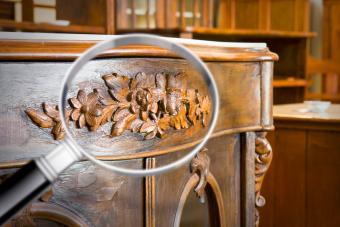
As your family furniture gets passed down from generation to generation, you might find yourself in need of an antique furniture appraisal at some point. If you're not a collector, the closest that you've probably ever been to an antiques appraisal is an episode of Antiques Roadshow. While the process in real-life isn't as convenient as having the appraisers waiting in the wings to look over your items, you can make an appraisal go pretty simply with the proper prep work.
First Things to Consider With Antique Furniture Appraisals
Not everyone will need to have furniture professionally appraised, but for people who enjoy collecting old pieces or have family heirlooms that've been passed down for generations, then getting a furniture appraisal can be a natural necessity. That being said, there're a few initial things that you need to work out before you commit to any appraisal company or service.
Look for Personal Property Appraisers
There are multiple different types of appraisers out there who specialize in a variety of vintage, antique, and fine goods. When it comes to antique furniture, you want to always find appraisers who're trained and certified as personal property appraisers. These appraisers can handle a number of personal goods, including the broad spectrum of historic furniture. Granted, not every personal property appraiser may be as knowledgeable about antique furniture as some are, so you also want to touch base with any potential appraiser as to what personal goods they have the most experience with.

Determine How Much You're Willing to Pay
Every professional appraisal is going to cost something, so it's important that you decide at the outset what kind of a budget you have for an appraisal so you can pick the right service for your situation. Prices widely vary based on the number of pieces you're having appraised, the licenses and experience that the appraisers have, and the state of demand in the market of goods that you're getting assessed. Usually, appraisals are charged by the hour and can cost anywhere between $100-$500 hourly, depending on the individual's qualifications and years of experience. Thus, you should establish a range that you're comfortable spending before choosing an appraiser.
Do Some Preliminary Research
Just because you're thinking about having your furniture looked at by a professional doesn't mean that you shouldn't do some preliminary research on your items. You can help your own appraisal experience by looking into what period or manufacturer your pieces come from. Simple characteristics and identifiers can help you narrow down a specialized appraiser (such as finding someone with a lot of experience in 19th and 20th century rattan furniture) so that you get the most for your investment.

Additionally, do a little research on the type of antique furniture you have can help you narrow down what pieces might be worth the price of having them appraised versus which ones can continue collecting dust in your grandma's attic.
Make Arrangements to Transport Your Furniture
Unlike the days of old where doctors made house calls, appraisers typically never come to your home to appraise an item. Thus, you'll almost always need to provide transportation for your furniture to and from the company's site. Keep this in mind when you're choosing in-person furniture appraisers, as distance can be a deciding factor depending on the number and size of the pieces that you're bringing in.
The Different Types of Antique Furniture Appraisals
When it comes down to it, there's not one unanimous reason that someone needs to get their antiques appraised. Each of the several possible reasons requires a different type of appraisal and may give the piece(s) a different value.
Insurance Appraisals
When you have your antiques evaluated for insurance purposes, you'll need to hire a professional appraiser. They'll identify your antique, take pictures, examine your item, and do a variety of comparisons from past sales and industry standards. The appraiser will consider all aspects of your item, including:
- Condition
- Provenance
- Desirability
- Age
- Rarity
They'll then try to find similar items and the prices that they fetched at auction or the value given to them by dealers and other appraisers. After they collect all information possible, they'll assign a replacement value to your item based on what it would cost to actually replace it.
Generally, the replacement value will be the highest value given to an antique. You should get a printed record of the value and how the piece was evaluated as well as pictures of your antique. It's important to keep this appraisal and the images in a safe place, like a safety deposit box in case of fire or flood, since they're the concrete evidence you'll need to get insurance policies placed on the items.
Fair Market Value Appraisals
Fair market value is the price that a buyer and seller agree on based on their own appraisal of the item. Generally, an antique dealer will base his price on his knowledge of the market, the condition of the item, and what he has paid for it. This value is usually not fixed, and you can often bargain for a better price. To establish a fair market value, there isn't any need to have a professional appraisal completed, but rather the buyer and seller use their own respective knowledge to assess the item(s) in question.
Estate or Tax Value Appraisals
When you inherit an item, the IRS may want an appraisal done. This appraisal will be based on how similar items have been evaluated, as well as on common auction prices.
Find an Appraiser That Fits Your Needs
Not every person requires an appraisal for the same reason, so it's natural that not every system for getting appraisals is going to suit everyone equally.
Comparative Appraisals Based on Market Prices
Finding a qualified appraiser can be difficult, especially if you live in a small town. If you're just looking for a ballpark figure for your own records or interests, then you may want to figure the appraisal yourself by comparing your item to other, similar items that've sold or are listed online. Some good sites to look for these value comparisons are:
Make sure when you're doing comparative appraisals that you take into consideration such things as condition, age, documented provenance, and how in-demand the item seems. Fluctuations in the market can significantly affect selling price, so you shouldn't use these informal appraisals as anything other than estimates.
In-Person Appraisers to Consider
By far, the safest way to get an accurate appraisal is to use a professional appraiser that's experienced in evaluating antique furniture. You can find an appraiser through organizations like the Appraisers Association of America and the American Society of Appraisers. For example, the AAA website lists expert appraisers from all over the country, as well as providing continuing education and support for its members. In order to be registered with AAA an appraiser must pass an exam and senior appraisers must have five years' worth of experience. Choosing personal property appraisers that belong to these trade societies is always a safe bet, particularly if you're new to the appraisal process and want a trusted source.
Online Appraisers for When You Need a Quick Response
Some companies are willing to do online appraisals, usually for a small fee and infrequently for free. You'll find that the cost of the appraisal is usually less than having a local appraiser evaluate your item, but the value given to your item may or may not be totally accurate, and they often won't give you the same documentation confirming the appraised amounts. Because of this, this type of antique furniture appraisal is usually not sufficient for insurance purposes.
Some websites where you can find online appraisals are:
You should know that it's impossible to give a totally accurate appraisal without physically examining the item; therefore, most online appraisals are only good for giving you an idea of the worth of something, and helping you determine if you want to go through a subsequent in-person appraisal process.
Tips for Choosing the Right Appraiser for You
It can be confusing when it's time to choose an appraiser for people not working in the business. Naturally, you want to get a good deal but don't want to skimp too much on cost and end up with a less-than-average appraisal experience. Yet, with a few tips, you can pick out the best appraiser to check out your furniture:

- Narrow your search - Before you choose an appraiser, you should narrow it down to two or three appraisers that are experienced similar items to yours.
- Check an appraiser's reviews and references - Get references from previous customers to see how an appraiser performed.
- Ask for recommendations - Ask at banks, insurance companies, antique auctions, and antique stores for the names of recommended appraisers.
- Never sell a piece to an appraiser - A reputable appraiser will not consider buying an item they're evaluating.
- Check their accreditations and society memberships - Appraisers who belong to professional societies like the American Society of Appraisers uphold industry standards and might have greater experience than those without any accreditations or memberships.
It's important to take your time when you're looking for someone to hire to complete an antique furniture appraisal for you. In most cases, you'll get what you pay for. It's important to note that there aren't any licensing requirements for an antique appraiser; anyone can open an office and take out an ad calling themselves an antiques appraiser, so double checking references, accreditations, and years of experience are the most surefire ways to not get scammed.
Turn Heirlooms Into Cash
Typically, people don't need to have their family heirlooms assessed by an appraiser. However, if you're thinking about getting your pieces insured or want to have them professionally auctioned, you'll need to have your antiques appraised at some point. Yet, lack of experience in the process doesn't condemn you to a bad appraisal, so long as you prepare properly and research your appraisers accordingly.







